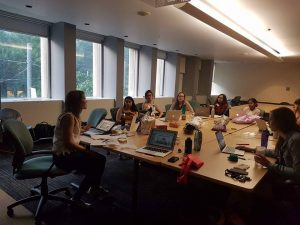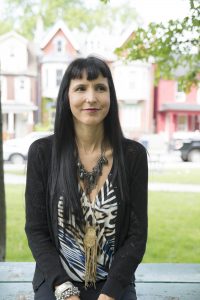The Next 150 Conference: Increasing dialogue at U of T on colonization and health
October 4/2017
By: Natalie Hope, MPH candidate in Social and Behavioural Health Sciences, DLSPH
The buzz of Canada 150 celebrations may be slowing, but dialogue about Canada’s colonial history is only picking up speed at the University of Toronto.
And for good reason. It’s been almost two years since the Truth and Reconciliation Commission (TRC) released their final report, calling on institutions and government to take action in an effort to repair the destructive trauma of residential schools, and work towards reconciliation between Indigenous and non-Indigenous peoples.
Associate Professor Suzanne Stewart, director of the Waakebiness-Bryce Institute for Indigenous Health at DLSPH, feels optimistic that U of T has embraced its role in reconciliation.
“I think the Truth and Reconciliation Commission calls to action are front and centre for university leadership,” said Stewart. “Right now is a critical time when Indigeneity is starting to be noticed by different disciplines other than Indigenous studies, and I think that the timing, in terms of the social and political landscape, is creating space for attention to Indigenous health at U of T.”
In response to the TRC’s calls to action, Dalla Lana School of Public Health students are working with Professor Stewart and a team of advisors on Indigenous health to create the 10th annual Student Led Conference, The Next 150: Resisting Colonialism and (Re)claiming Health on Turtle Island.
The conference aims to address the impacts of colonization on the health and wellbeing of Indigenous peoples by examining critical research, community resistance, and land and food sovereignty. Each of these three streams aims to highlight the important work of Indigenous scholars and community advocates, while focusing on strengths and resiliency of Indigenous communities. The Next 150 is shifting away from the traditional definition of health as the absence of illness, rather approaching it from a holistic perspective which includes mental, physical and spiritual well-being.
“I hope attendees will learn about the resiliency of Canada’s Indigenous communities, and recognize the impacts of colonization and systemic oppression in our current society,” said Vinusha Gunaseelan, a member of the student-led conference planning team and IHPME student.

The Next 150 planning team, engaging in continuous learning on colonialism during a Cultural Safety and Anti-racisim/Anti-oppression workshop.
Colonization is widely recognized as a key determinant of health. Colonial legislation on this land has contributed to more than 500 years of marginalization, dispossession and criminalization of Indigenous peoples, as well as more than 100 years of cultural genocide through the residential school system.
However, Indigenous peoples continue to resist colonization, seek to reclaim the health of their communities, and change the social and political landscape on Turtle Island, an Indigenous term for North America.
In an effort to put the TRC’s calls to action, The Next 150 will honour Indigenous resistance to colonization and consider how non-Indigenous people may engage in meaningful solidarity and collaborate across disciplines moving forward.
“What I hope that people will take away is understanding why it’s important to learn about colonization and how it affects the health, not just of Indigenous people, but of all Canadians,” said Stewart. “I think it’s important for people to come away with some solutions to some of the challenges and problems that have been created by the colonial history and current colonial context.”
Through community workshops, presentations, panel discussions and land-based activities, this conference will encourage critical and productive discussion on how we may work together toward reconciliation.
Come see Dr. Suzanne Stewart, a keynote speaker at The Next 150 conference, on Friday, November 10 at DLSPH. Click here for tickets.
Interested in getting involved in this event? Click here to submit a proposal.
Follow us on Facebook and Twitter where we are using the hashtag #reclaiminghealth to share examples of improving health and well-being through resistance to colonization.
